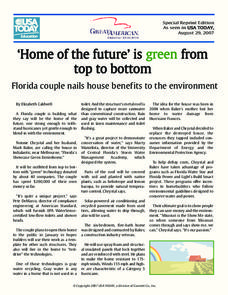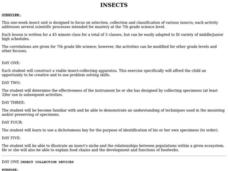Curated OER
Using Our Natural Resources Wisely
Young scholars understand how ground water can be recycled to maximize its usage and begin to think about ways conservation can help Kansas preserve its natural resources in other areas - soil, minerals, and clean air.
Curated OER
The Chemistry of Coal
Students investigate the chemistry of coal. This lesson serves as a review of conservation of mass, simple reactions and equation balancing. During the lesson, students research chemical components of coal, as well as environmental...
Curated OER
We Are All Responsible
Young scholars conduct research about the issue of conservation and the environment. They focus upon the interdependence of man and nature. They write and discuss the issue of environmental preservation. Students appreciate the...
Curated OER
Resources - A Reading Guide
For this resources worksheet, students compare and contrast physical and chemical properties and changes. Students review the periodic table, pattern of atomic numbers and chemical reactivity. This worksheet has 56 short answer questions.
Curated OER
Paper Capers
Students demonstrate how much paper is thrown away in their classroom in one week. They estimate the weight of paper used, weigh the paper at the end of five days, and discuss how students can use less paper.
Curated OER
What Are The Properties of Sea Water?
Ninth graders conduct research on the subject of sea water. They use a variety of resources to obtain information. There are helpful resource links listed in the lesson. In conjunction with the research students make inquiry of the...
Alabama Learning Exchange
Good Litter, Bad Litter
Which ones can be thrown on the ground? Discover the difference between natural litter and unhealthy trash, helping scholars by using several examples. Use the information here to give them a basic background, but also encourage prior...
Curated OER
Quilt Squared
Students study West Virginia quilts. In this mathematics instructional activity, students use symmetry, geometric shapes, and patterns to create their own quilt square.
Curated OER
Water: Our Most Important Beverage
Third graders create a KWL chart about water. In this environmental science lesson, 3rd graders demonstrate how much water on Earth is usable. They act out the different stages of the water cycle.
Curated OER
Water Works
Students create a "water web" to illustrate the interdependence among water users and producers. They distinguish between direct and indirect uses of water; illustrate the interconnectedness of water users in a community; and demonstrate...
Captain Planet Foundation
Rotting Away
What happens at the end of a plant's life cycle? Show kids the natural way that plants show that they're decomposing, as well as the importance of compost, with a lesson about living organisms. After reading Log Cabin by Anne Schreiber,...
Curated OER
Fourth Grade Science
In this science worksheet, 4th graders answer multiple choice questions about coastlines, electric cars, the food chain, and more. Students complete 25 questions.
Curated OER
The Integration of Science and Math Through Ecosystems
Students use the disciplines of math and science to examine ecosystems. In groups, they calculate the amount of supplies they would need to live in the classroom for one day, a week and a year. Using this information, they apply it to...
Curated OER
God's Creation
Second graders explore religion by analyzing the state of the country. In this American creation lesson, 2nd graders read that God created the world and therefore the United States and all of the beautiful things within the country....
Curated OER
Natural Beauty: Looking Sharp
Young scholars create covers for their "nature journals" using watercolor techniques and the artistic ideas of color, depth, and focal point. This lesson can be used in the Science or Art classroom and meets national standards for both.
Curated OER
Protecting Our Planet
Students examine the impact of pollution. In this pollution lesson, students watch Protecting Our Planet, then participate in a simulation of the effect of pollution on a variety of organisms.
Curated OER
Our Green City
Students practice beginning reading while exploring an environmental theme. For this our green city lesson, students create their own published books, examine phonemic awareness, alphabetic principle, comprehension, and vocabulary.
Curated OER
Stopping Global Climate Change
High schoolers synthesize or express concepts towards solving the question posed at each lab station about climate change. After all lab teams have finished, the teacher facilitates a class discussion on teams' responses to each station.
Curated OER
Building Green
Students read an article and learn about building green. In this environment lesson, students visit a website to learn about Mark Baker and Nonnie Chrystal. Students write down the three events that led them to explore...
Curated OER
Insects
Students construct a viable insect collecting apparatus. Students determine the effectiveness of the instrument he has designed by collecting specimens.
Curated OER
SAVE OUR EARTH
Students research current environmental problems in order to develop and deliver an oral presentation. The presentation persuades the audience to act on the student's point of view on the issue.
Curated OER
COMPOSTING: WHY BOTHER?
Students explore the composting process and participate in a contest to make the most compost the fastest from the school's kitchen and yard waste.
Curated OER
Hazardous Waste Issues in the News
Students work together to research hazardous waste in the news. They discover how large the hazardous waste issue is. They complete an experiment and discuss how the issues affect their community.
Curated OER
Aquifer Model
Students, after researching and brainstorming about aquifers and locating aquifer maps of Texas, participate in the building of a model of an aquifer complete with a pumping station. They also answer a variety of questions at the...

























